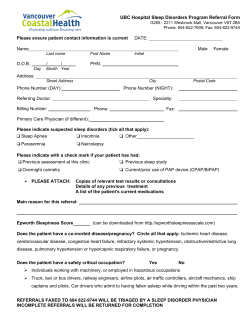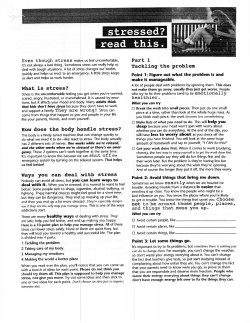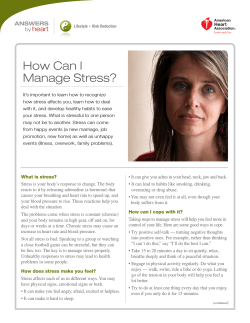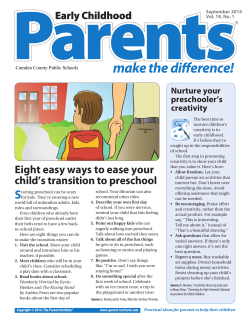
How much sleep do I need? relaxing music or reading.
How much sleep do I need? How much sleep you need varies a lot from person to person. An average is 7½ hours but normal can be between 3 and 12 hours. What is a ‘good’ night’s sleep? A ‘good’ night’s sleep should allow you to be refreshed and wakeful during the day. (Although in some rheumatology conditions it is common to feel fatigue in the day). What sort of things does lack of sleep do? Lack of refreshing sleep can cause problems such as day time sleepiness, difficulty concentrating and less motivation to do tasks. It can also become an unhelpful cycle when lack of sleep increases anxiety and depression so making pain worse and so affecting sleep. Poor sleep Increased pain Anxiety & depression How do I break the cycle? Try to establish a routine bedtime and regular waking time. Here are some simple but effective do’s and don’ts to help you improve your sleep. Your bedroom: Do’s: If possible keep your bedroom as a room that you only use for sleeping, e.g. not used as an office as well. Keep your bedroom at a comfortable temperature, not too hot. The bedroom is as peaceful and quiet as possible. Use you curtains to block out the light. Have as comfortable and supportive a bed as you can. (Your bed should support your body and neck following the natural curves. Too many or too few pillows can lead to an aching neck). Don’t: have an untidy, cluttered bedroom. Before you go to sleep: Do’s: Do something restful before you go to bed e.g. listening to relaxing music or reading. Keep a regular bedtime (your body clock will adjust). A warm milky drink before you go to bed can help A warm bath before you go to bed can help. (You might like to use relaxing oils in your bath such as lavender – always read the instructions carefully). Take adequate pain relief before you go to bed such as anti-inflammatories and pain killers. Use other pain relieving aids such as hot or cold packs or gentle massage Use you resting splints if your joints are painful or swollen. Don’ts: Don’t exercise for at least an hour before you go to bed. go to bed hungry or over full. Eat only a light snack if you need something. drink stimulating drinks before bed eg tea, coffee and cola. drink alcohol as a nightcap. It may help to get you to sleep but will disturb your sleep in the night. rely on sleeping tablets regularly if you can help it. These are useful short term but are better avoided long term. If you still cannot get to sleep: Do’s: Get up and go into another room. Do something relaxing such as reading until you feel sleepy then go back to bed. Repeat this as often as you need to. Write down anything on your mind which is keeping you awake. Don’t: lie in bed not sleeping, get up and go to another room until you feel sleepy then return to bed and try again. Daytime: Keep as active as possible during the day. A regular exercise programme will help with your sleep quality. Don’t sleep in the daytime. Comments, compliments or complaints We welcome any suggestions you have about the quality of our care and our services. Contact us: Freephone: 0800 1613997 Phone: 01625 661449 Textphone: 01625 663723 Customer Care, Reception, Macclesfield District General Hospital, Victoria Road, SK10 3BL For large print, audio, Braille version or translation contact the Communications and Engagement Team on 0800 195 494. Admission information The trust accepts no responsibility for the loss of, or damage to, personal property of any kind, in whatever way the loss or damage may occur, unless deposited for safe custody. Please leave valuables at home. If you need to bring personal items that are expensive, for example micro hearing aids, please be aware that you do so at your own risk NHS Direct (part of NHS Choices) is a 24 hr phone advice service providing confidential health advice and information. Phone: 0845 4647 (Textphone 0845 606 46 47)www.nhs.uk East Cheshire NHS Trust is committed to ensuring that patients and staff will always be treated with dignity and respect. There will be no age, disability, gender, race, sexual orientation or religious discrimination. Improving Sleep Information for patients Rheumatology Service Sandra Hargreaves, Occupational Therapist 01625 661484 Jenny Ratcliffe, Physiotherapist 01625 661481 Elizabeth Meecham, Rheumatology Nurse, 01625 661978 Macclesfield District General Hospital www.eastcheshire.nhs.uk @eastcheshirenhs Ref:10893 Review: 1/2016
© Copyright 2025





















